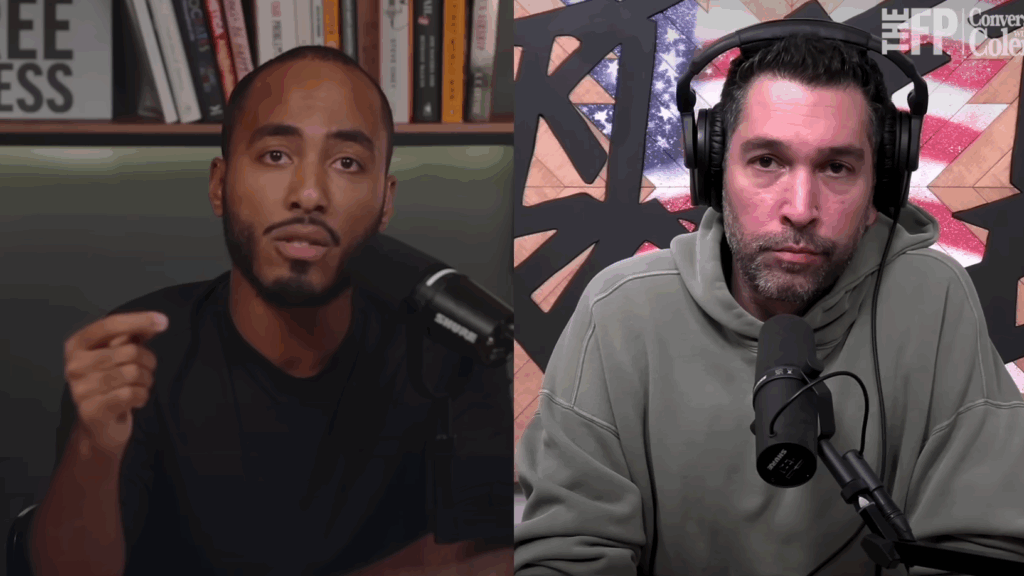International Politics
Dave Smith Gets His Comeuppance
Watching the debate between comedian and political podcaster Dave Smith and writer Coleman Hughes on the Middle East, Israel, and American Empire earlier this month was like seeing an unjust war against an unarmed combatant unfold, relentlessly, over three and a half hours. Hughes came with historical context, nuance, and a well-researched understanding of the Middle East. Smith came with his bag of pundit party tricks, and almost from the beginning, he was left scrambling at the bottom.
Over the past several years, Smith has become one of the most prominent anti-Israel voices on the Online Right, appearing on Joe Rogan’s podcast thirteen times in the past five years and racking up over 830,000 followers on X. In April, he appeared on The Joe Rogan Experience alongside journalist Douglas Murray, who declined to debate Smith and instead chose to excoriate Smith’s lack of expertise. Murray’s point—that expertise matters—was correct. Murray’s strategy, as Hughes’ methodical demolition highlighted, was the wrong one. On issue after issue, Hughes had Smith on the ropes.
Hughes debunked Smith’s claim that Israel pushed the U.S. into war with Iraq, noting that Ariel Sharon had, in fact, consistently advised Bush against invasion and occupation; Israel only supported it after the Bush administration made it clear that it was a done deal. Smith’s narrative didn’t just fall apart in the face of the evidence Hughes provided; it collapsed. Hughes also challenged Smith’s narrative about the allegedly all-powerful Israel lobby which, he noted, is tiny compared to most, and was in fact outspent by the dentist’s lobby during the Obama years. As Hughes noted in his summary of the debate:
[T]he Israelis couldn’t get Bush to add one little word to his Palestine speech in 2002. For 36 years, they could not get the U.S. to recognize Israeli sovereignty over the Golan Heights, which would have required one stroke of the presidential pen. They couldn’t get Bush to mount a campaign against Syria’s admission to the UN security council in 2002. They couldn’t get Bush to bomb Syria’s nuclear facilities in 2007. Yet we are supposed to believe that a country with the size and population of New Jersey, which couldn’t get America to do any one of these smaller favors, somehow got us to fight an entire war—and they accomplished all of this with a lobbying budget the same size as Big Dentistry?
If it weren’t such a serious slander, it would actually be laughable.
Hughes also addressed Smith’s favorite talking point—a memo described by an unnamed member of the Defence Department to General Wesley Clark detailing a plan for regime change in seven countries. Clark never saw the memo, but Smith insisted that because Clark’s source had told him that a “decision had been made,” the memo was clearly operative.
“Everyone else in the room does not say the decision had been made,” Hughes noted, after citing a series of first-hand accounts. “Your only evidence is the guy who never read [the memo]. If you were a historian writing a book, you’d have to cut this out of the book because you’re relying on the hearsay of someone who never even read the document.”
A visibly frustrated Smith responded: “I’m not a historian writing a book. I’m a guy talking about these issues to the American people. You can decide for yourself if you find that to be a pretty interesting story or not.” Indeed. That sums up the difference between having an evidentiary standard based on the historical method, and a “guy talking about these issues” and telling a “pretty interesting story” that you—that is, the viewer—can judge. That’s a great podcasting strategy. It is not historiography, and it is not a remotely reliable way to get to the truth.
READ THE REST OF THIS COLUMN AT THE EUROPEAN CONSERVATIVE








